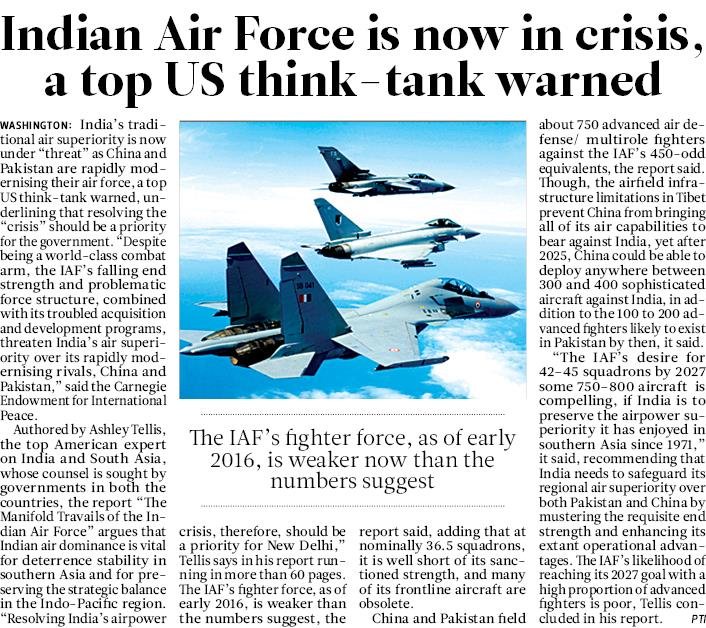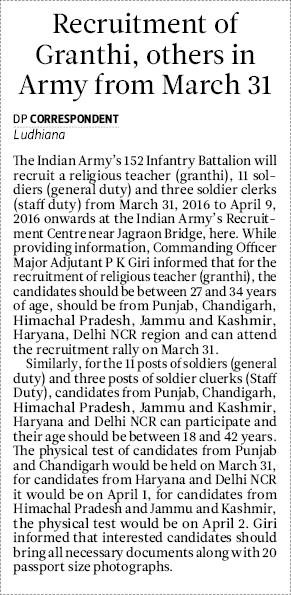
Sarang helicopters maneuvre their skill at the inauguration of the 9th edition of Defexpo in Panaji, Goa, on Monday. PTI
Quepem (Goa), March 28
After a delay of over a year, the much-awaited new defence procurement policy was unveiled by the government today with an aim to ensure transparency, fast-track acquisitions and to lend a push to the “Make in India” initiative.The Defence Procurement Procedure (DPP)-2016 announced by Defence Minister Manohar Parrikar, however, did not contain a key chapter on the proposed strategic partnership. Parrikar said it would take another 2-3 months to finalise the model.To be applicable from April, the procurement policy lays the roadmap on how India, the world’s largest arms importer, will acquire defence equipment in future.The announcement was made at the inaugural ceremony of the Defence Expo (Defexpo)-2016 at Quepem town, about 50 km from Panaji. The new DPP has included a new category to acquire weapons—IDDM (indigenously designed, developed and manufactured). The IDDM will be the first preferred category.Parrikar said a review of the new DPP would be undertaken after six months. “I do not say the document is foolproof. Let us take a review after six months. Nothing is perfect, but we are taking it to perfection,” he said.He said the DPP could push the agenda of “Make in India” and country’s target of achieving defence industry network. With the new DPP, it would be ensured that there was greater transparency and faster clearances, he said.The DPP has been loaded online on the Defence Ministry’s website and will be made available in hard copy format after 15 days.Parrikar said certain concerns of foreign companies would be addressed through this policy over 3-4 months. The new policy also allows the Defence Acquisition Council to take a “fast-track” route to acquire weapons, something which was limited to only the armed forces till now.In a bid to cut down on the time taken for acquisition process, it mandates that all AONs (acceptance of necessity) of a particular platform will be valid for only six months as against the 12-month deadline now.Also, no AON will be notified until it is accompanied by a finalised RFP (request for proposal or tender). This means the time taken for an RFP has been cut down drastically.Parrikar said defence export clearances were to be granted online. He said the policy would also include “Start-up India” initiative.Parrikar had earlier said the new blacklisting policy would also be issued separately next month and made it clear that there would be “no relaxation” for those already blacklisted. “Bribe givers” would be punished, he said.However, the existing blacklisted firms would be allowed to appeal before a vigilance committee of the Defence Ministry for delisting under the new policy. — PTI
Speeding up acquisitions
- The new policy is aimed at fast-tracking acquisitions and lending a push to the ‘Make in India’ initiative
- It introduces a new category to acquire weapons-IDDM (indigenously designed, developed and manufactured)
- It allows the Defence Acquisition Council to take a ‘fast-track’ route to acquire weapons, which was limited to the armed forces till now
- It will be reviewed after six months and the effort will be to ensure greater transparency and faster clearances, Defence Minister Manohar Parrikar said
IAF in crisis, says US think-tank
- India’s traditional air superiority is under ‘threat’ as China and Pakistan are rapidly modernising their air force, a top US think-tank warned on Monday
- “The IAF’s falling end strength and problematic force structure, combined with its troubled acquisition and development programmes, threaten India’s air superiority over its rapidly modernising rivals, China and Pakistan,” said the Carnegie Endowment for International Peace



